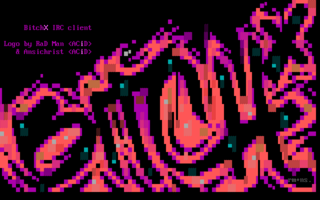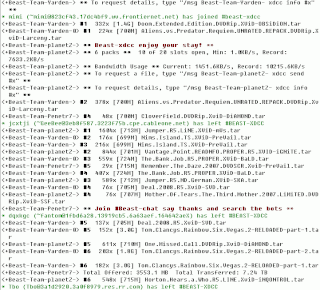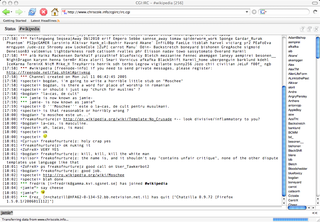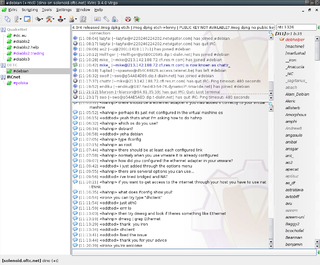
BitchX is a free IRC client that has been regarded as the most popular ircII-based IRC client. The initial implementation, written by "Trench" and "HappyCrappy", was a script for the IrcII chat client. It was converted to a program in its own right by panasync. BitchX 1.1 final was released in 2004. It is written in C and is a TUI application utilizing ncurses. GTK+ toolkit support has been dropped. It works on all Unix-like operating systems, and is distributed under a BSD license. It was originally based on ircII-EPIC, and eventually it was merged into the EPIC IRC client. It supports IPv6, multiple servers and SSL, and a subset of UTF-8 with an unofficial patch.

Internet Relay Chat (IRC) is a text-based chat system for instant messaging. IRC is designed for group communication in discussion forums, called channels, but also allows one-on-one communication via private messages as well as chat and data transfer, including file sharing.
FastTrack is a peer-to-peer (P2P) protocol that was used by the Kazaa, Grokster, iMesh and Morpheus file sharing programs. FastTrack was the most popular file sharing network in 2003, and used mainly for the exchange of music mp3 files. The network had approximately 2.4 million concurrent users in 2003. It is estimated that the total number of users was greater than that of Napster at its peak.

XDCC is a computer file sharing method which uses the Internet Relay Chat (IRC) network as a host service.
Direct Client-to-Client (DCC) is an IRC-related sub-protocol enabling peers to interconnect using an IRC server for handshaking in order to exchange files or perform non-relayed chats. Once established, a typical DCC session runs independently from the IRC server. Originally designed to be used with ircII it is now supported by many IRC clients. Some peer-to-peer clients on napster-protocol servers also have DCC send/get capability, including TekNap, SunshineUN and Lopster. A variation of the DCC protocol called SDCC, also known as DCC SCHAT supports encrypted connections. An RFC specification on the use of DCC does not exist.
cURL is a computer software project providing a library (libcurl) and command-line tool (curl) for transferring data using various network protocols. The name stands for "Client for URL".

A botnet is a group of Internet-connected devices, each of which runs one or more bots. Botnets can be used to perform Distributed Denial-of-Service (DDoS) attacks, steal data, send spam, and allow the attacker to access the device and its connection. The owner can control the botnet using command and control (C&C) software. The word "botnet" is a portmanteau of the words "robot" and "network". The term is usually used with a negative or malicious connotation.

Eggdrop is a popular IRC bot and the oldest that is still being maintained.
An IRCd, short for Internet Relay Chat daemon, is server software that implements the IRC protocol, enabling people to talk to each other via the Internet. It is distinct from an IRC bot that connects outbound to an IRC channel.
Client-to-client protocol (CTCP) is a special type of communication between Internet Relay Chat (IRC) clients.
Internet Relay Chat Flooding/Scrolling on an IRC network is a method of disconnecting users from an IRC server, exhausting bandwidth which causes network latency ('lag'), or just disrupting users. Floods can either be done by scripts or by external programs.

Colloquy is an open-source IRC, SILC, ICB and XMPP client for Mac OS X. Colloquy uses its own core, known as Chat Core, although in the past it used Irssi as its IRC protocol engine. One of the primary goals behind Colloquy was to create an IRC, SILC and ICB client with Mac OS X visuals. Colloquy contains a user interface that follows Apple's Human interface guidelines in addition to containing support for traditional IRC command-line controls such as /nick and /join.
The following is a comparison of instant messaging protocols. It contains basic general information about the protocols.
Rizon is a large Internet Relay Chat (IRC) network with an average of around 20,000 users. The IRC network itself ranks number 5 among the largest IRC networks. Rizon is popular with many anime fansubbing groups who work online, many of whom provide their content through XDCC via IRC bots in their distribution channels. It is also used by many users of eRepublik as a means of communication. File sharing of other copyrighted material such as Warez is also common in some channels on the network.

CGI:IRC is a CGI program written in Perl that allows access to IRC via a web browser. It is designed to be flexible and has many uses such as an IRC gateway for an IRC network, a chat-room for a website or to access IRC when stuck behind a restrictive firewall.
glFTPd is a freely available FTP server which runs on Unix, Linux, and BSD operating systems. It has number of features, like logins restricted by a particular set of IP addresses, transfer quotas per-user and per-group basis, and user/groups not stored in the system files, which make it attractive to private warez servers, including topsites. It does have legitimate uses though—a number of web development books recommend it amongst other general purpose FTP servers, and some Linux certification exams of SAIR required knowledge of it. It can integrate with Eggdrop through IRC channels.

KVIrc is a graphical IRC client for Linux, Unix, Mac OS and Windows. The name is an acronym of K Visual IRC in which the K stands for a dependency to KDE, which became optional from version 2.0.0. The software is based on the Qt framework and its code is released under a modified GNU General Public License.
Plouf's Java IRC (PJIRC) is a web-based open-source IRC client that is written in Java. Any web browser that supports the Java Runtime Environment, or an alternative Java interpreter, can use the applet. Many IRC networks have a public installation of the applet for their network.
UnrealIRCd is an open-source IRC daemon, originally based on DreamForge, and is available for Unix-like operating systems and Windows. Since the beginning of development on UnrealIRCd c. May 1999, many new features have been added and modified, including advanced security features and bug fixes, and it has become a popular server.

IceChat is a full-featured graphical IRC client for Windows. Its current version is open-source and released under the GPLv2 license.








